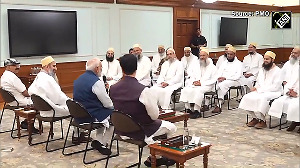At the end of his one year in office, Jammu and Kashmir Chief Minister Ghulam Nabi Azad admitted governing the state was not as easy as anyone might have thought.
"Yeh ishq nahin hain aasan, bas itna samajh lijiye; ek aag ka dariya hain, aur doob ke jana hain (the pangs of love are not easy to bear; it is a river of fire you must cross while drowning)," the chief minister told a ceremony held to mark his first year in office.
"It is not easy to run the state. There is a lot of external interference, which makes effective governance difficult," he told the gathering.
"Unlike other states, Jammu and Kashmir is confronted with political interference and many, either behind the curtains or openly, try to make this state a game field for political machination," the chief minister said, adding this has considerably 'hampered the positive growth of economy and development of the state'.
The chief minister heads a coalition of sorts, where his own allies often become his bitter critics.
Azad himself has been making veiled references to the 'unrealistic promises' made to the people by his major political ally in the alliance, the People's Democratic Party of former chief minister Mufti Mohammad Syed.
"Let us apply ourselves to the problems on this side rather than showing greener pastures to the people on the other side" - this statement made by the chief minister some time back clearly spoke of his reservations about the PDP trying to play a larger role by harping on self-rule and similar formulations to resolve the Kashmir issue.
Azad's problems are multi-dimensional. While his promise of eradication of corruption from public life remains unfulfilled, custodial killings by security forces continue despite Azad's promise that Prime Minister Manmohan Singh's directive of 'zero tolerance against custodial killings' would be completed without any compromise.
"There have been least custodial killings by the security forces during the last year than during the other periods since the beginning of militancy," he said, highlighting his achievements in office.
He also claimed that developmental works worth Rs1800 crores had been started without any administrative approval since 1990.
"I have dispensed with that and a strict monitoring mechanism is now in place. For the first time in the history of the state, the government has equipped itself with powers to confiscate the properties of corrupt and unscrupulous officials. So far 15 such properties have been seized," he asserted.
Although he started the system of double shifts in the engineering departments to complete works in the stipulated periods, allegations of rampant corruption in the various engineering departments of the government continue to pour in.
"There has been no difference. Corruption continues as before. For some time after he became the chief minister, government officials used to ask for money cautiously. Now they are back to their old practice of asking gratification as a matter of right," said Mohammad Shafi, 45, a contractor in Srinagar.
In all fairness to the chief minister, his best intentions are defeated by an administration that has lived on corruption for too long to change overnight. "He is a well-meaning person, but he doesn't have the team. Some of his ministers are also his biggest problem," said a newspaper editor.







 © 2025
© 2025